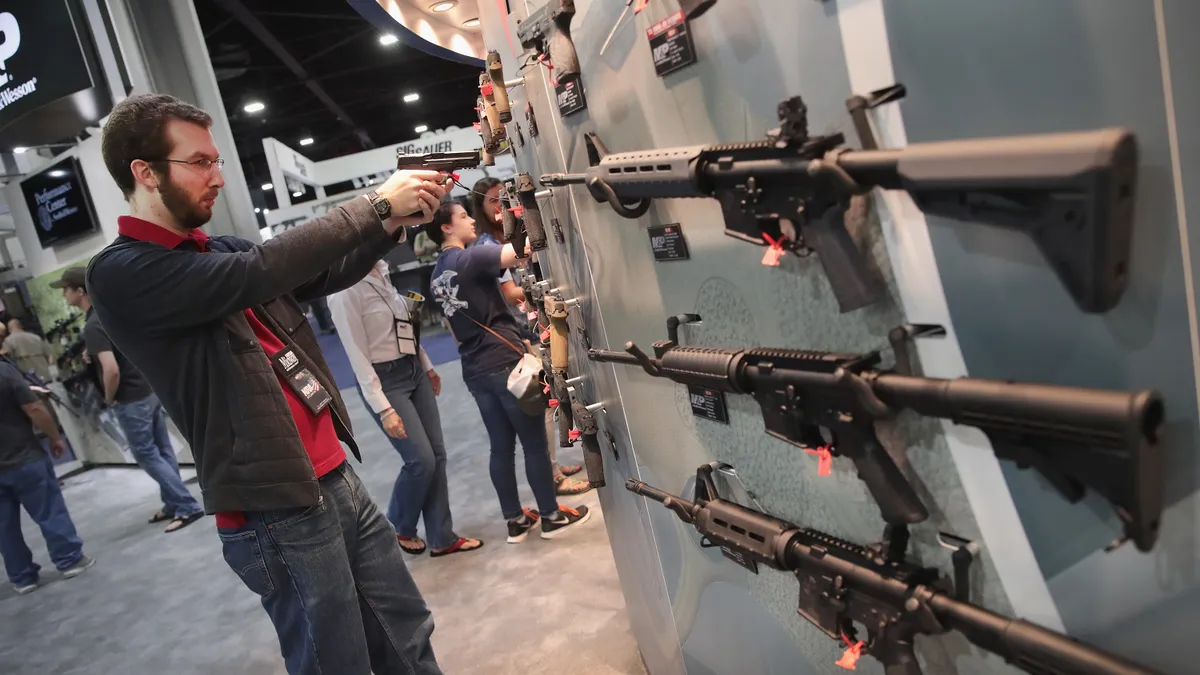Dive Brief:
- Four congregations of Catholic nuns filed a lawsuit against Smith & Wesson last week over the gun maker’s continued marketing and sales of AR-15 assault rifles, commonly used in mass shootings. The nuns, who are shareholders of the company, filed a stockholder derivative suit against the board that named Smith & Wesson as a nominal defendant.
- The nuns submitted shareholder proposals at Smith & Wesson and Sturm, Ruger & Co. for years, which were met with no action, and the lawsuit represents a logical next step, an attorney for the plaintiffs told ESG Dive. The congregations filed the suit in Clark County, Nevada, and are represented by New York law firm Newman Ferrara.
- While it’s too early to tell whether the suit will be able to continue or ultimately succeed, the complaint follows in the footsteps of other liability suits against gun manufacturers, like the one settled last year for $73 million between families of the victims the 2012 Sandy Hook Elementary School shooting and Remington, Victor Flatt, Case Western Reserve University’s environmental law chair, told ESG Dive.
Dive Insight:
The plaintiffs alleged the board of directors was aware of both the weapon’s role in facilitating mass shootings, and welcomed the fact that its revenues increased following such events. The complaint points to the company’s 2019 10-K filing, which noted the company experienced “increased near-term consumer demand” following speculation about gun violence prevention laws that typically enters conversations following a mass shooting.
The lawsuit was filed by the Adrian Dominican Sisters from Adrian, Michigan; Sisters of Bon Secours USA from Marriottsville, Maryland; Sisters of St. Francis of Philadelphia of Aston, Pennsylvania; and Sisters of the Holy Names of Jesus & Mary of Marylhurst, Oregon.
“By design, [AR-15s] inflict the greatest number of casualties with maximum bodily harm in the shortest amount of time and are easily modified for automatic fire,” the congregations said in a joint statement. “These rifles have no purpose other than mass murder. They are not the sporting rifles that members of our own families and other responsible gun owners value.”
Flatt said anyone who holds shares of a company has the right to file a shareholder derivative lawsuit, and he expects to see more derivative suits filed over environmental, social and governance factors going forward. Whether the suit ultimately wins in court, Flatt said he believes it will be successful in pressuring Smith & Wesson and other gun manufacturers to think about liability risks from the marketing and sales of assault weapons.
“Companies that engage in issues that a large part of the public finds to be morally reprehensible are going to continue to see the risks in their business models increase,” Flatt said.
The lawsuit alleges Smith & Wesson’s board breached its fiduciary duty to its shareholders by marketing AR-15s in a way that potentially came across as appealing to juveniles or criminals, in violation of a settlement the company made with the federal government in 2000. The suit said the company’s board and executives have known since at least 2000 that marketing plays a major role and “have since chosen to flagrantly ignore” safe marketing processes and “instead focus on the continued targeting of young consumers.”
The coalition said that after showing 153 years of strategic risk-averse business operations, the company has turned toward profit chasing. The coalition said the board has pursued increased revenues using illegal marketing tactics that knowingly attract a “dangerous category of consumers” and facilitates an ongoing spate of mass killings.
“At bottom, Smith & Wesson covets short-term profit over long-term risk,” the complaint says. “[The company’s strategy on AR-15s] causes the company to face an ever-increasing and substantial likelihood of liability that threatens its long-term existence.”
The sisters’ shareholder proposals at Smith & Wesson have received some support, most recently one calling for a third-party human rights impact assessment of the company’s practices. That proposal received a vote in a September meeting and received 26.7% support, despite the board recommending it be voted down.
Flatt said the success of the case will depend largely on whether the court is open to the theory that Smith & Wesson’s board is opening itself to liability suits by continuing to market and sell its product the way it is, in light of the Sandy Hook settlement and the ongoing liability suit from families and attorneys for victims of the 2022 mass shooting in a Buffalo grocery store against a gun retailer and body armor manufacturer.












